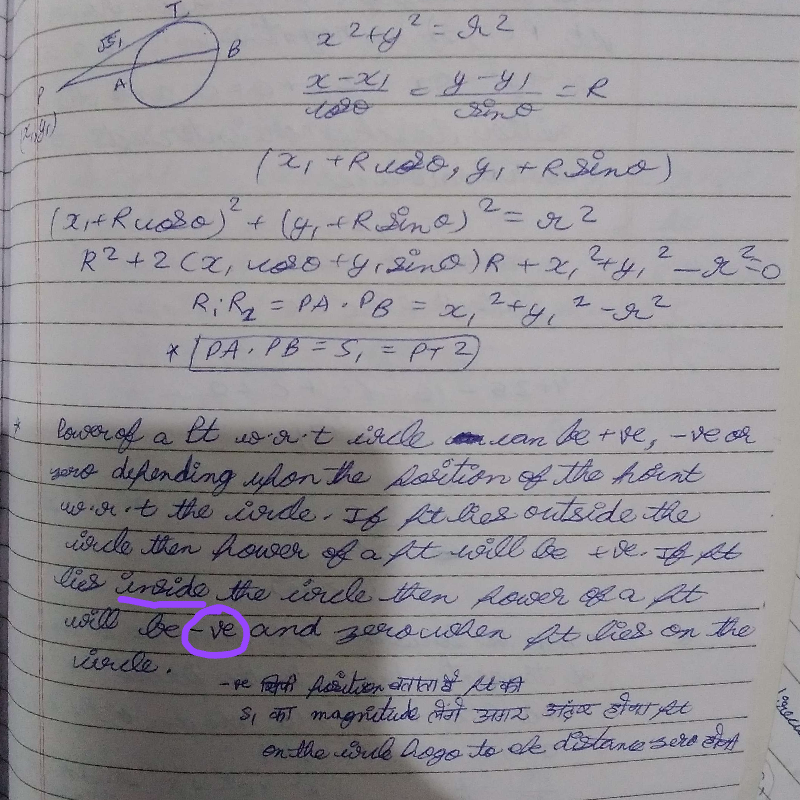23 Replies
@Apu
Note for OP
+solved @user1 @user2... to close the thread when your doubt is solved. Mention the users who helped you solve the doubt. This will be added to their stats.According to my understanding, first mei shayad PT kuch hoga nahi kyunki ham circle ke ander wale point se kaise ek tangent draw kar sakte hai
But the value will be negative for sure

how can it be -ve if its just product of distances
ig then we can say PA.PB= S1
ohh this will give power of point as -ve
but still logically -ve kaise
I guess using vector form gives -ve sign
idk if you'll see it this way but try to visualise AB line getting rotating through P
you'll see that the distance between one part of the line (PA) and other part (PB) is always constant
power of a point is a completely different concept man
CP^2-R is called the power of a point
where C is centre and P is the point
CP^2 is the distance between the point and the centre and if the point has a distance lesser than the radius, then CP^2-R obviously negative
if the point is outside the circle then the distance between centre and point is larger than the radius
oh fun fact idk if u were taught this
power of a point is also s11
just substitute the point in the circle equation you'll get the power
You're doing it the other way round. First one is the general case, and second one is an extension where the secant through is in limiting case, ie, tangent. Basically, you're saying that line is cutting the circle at T, then again immediately cutting at T again. Limiting case hai na?
Oh makes sense
But I am confused about what the constant value is
In case 2 ik pa.pb= px.py is a constant equal to square of length tangent from P to circle
In case 1 pa.pb= px.py is constant equal to...?
I don't think that's a constant.
Technically hona toh chahiye na
Why?
Not all points inside a circle are the same.
i mean for that certain point
for P outside the circle its S1
for P inside..?
Still S1 I presume, but absolute values.
ig ill try it out with diff equations of circle and check it manually
The power of the point is mathematically d^2-r^2 where d is the distance of point from the center, which is equal to (d-r)(d+r). In case 1, it gives you negative of the product of PX and PY if XY is a diameter, which is equal to PA.PB . Similarly for case 2, PA.PB refers to the positive of power of the point if AB is a diameter. Thus in both cases, the given things are equal to absolute value of power of point.
According to my understanding.
how can product of distances be -ve tho
the power of the point is not the product of distances, rather as pointed above (d-r)(d+r). If the point is inside the circle, d would be less than r and hence it turns -ve. Absolute value of this is the product of distances.
This doesn't have a full stop at end.
ohhh
so in case 2 it just happens to S1
is it the same for case 1 ??
Yep, just take the absolute values to get the product of lengths.
alr thankss
@SirLancelotDuLac
+solved @SirLancelotDuLac
Post locked and archived successfully!
Archived by
<@741159941934415883> (741159941934415883)
Time
<t:1741754113:R>
Solved by
<@1075951732460376214> (1075951732460376214)
